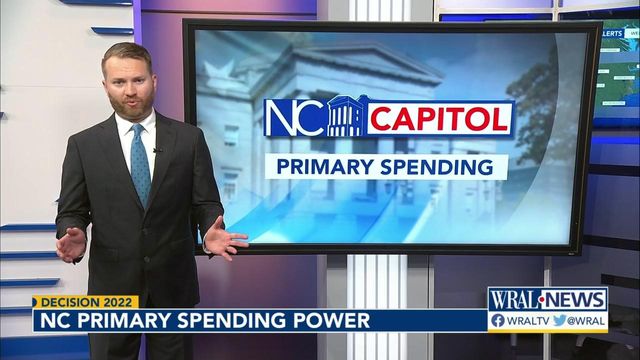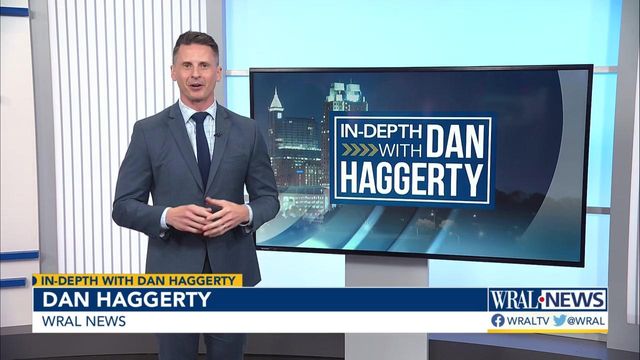The winner of North Carolina's primary elections? Big, outside money.
Political interest groups from outside of North Carolina offered an unprecedented level of financial support to candidates, including some who couldn't win without it.
Posted — UpdatedOn paper, Bo Hines had no business winning the Republican primary in North Carolina’s 13th Congressional District.
The 26-year-old faced former U.S. Rep. Renee Ellmers and Kelly Daughtry, whose father was a longtime state legislator. Other candidates, including runner-up businessman DeVan Barbour, had deeper ties to the area than Hines, who moved there only after launching his campaign.
In a vacuum, Hines’ success might seem novel. However, experts say it’s indicative of a larger trend: Out-of-state special interest groups pumping money into state races, often lifting lesser-known candidates to victory.
Political groups based outside of North Carolina poured millions of dollars into the state to help their preferred candidates in senate and congressional races. And on Tuesday night, that financial assistance proved decisive as many candidates with the most outside support won their races.
“The power of grassroots donations certainly have been at the forefront of recent campaigns, but the influence of national groups and their donations into races still carries a lot of weight,” said Michael Bitzer, a longtime political science expert at Catawba College.
On the Democratic side, the American Israel Public Affairs Committee spent millions in the 1st and 4th congressional districts.
Among the other North Carolina Candidates who benefitted from outside money:
- In the 1st Congressional District, moderate state Sen. Don Davis beat former state Sen. Erica Smith in the Democratic primary with help from $2.1 million in funding from outside groups. Davis faced criticism for supporting GOP-backed state budgets and anti-abortion legislation.
- In the 4th Congressional District, state Sen. Valerie Foushee won the Democratic primary over Durham County Commissioner Nida Allam and singer Clay Aiken with help of $3.4 million from outside groups. Foushee lost endorsements for not rejecting support from AIPAC, which has previously endorsed Republicans. The Protect Our Future PAC, founded by cryptocurrency billionaire Samuel Bankman-Fried, also spent more than $1 million to help Foushee in the primary.
- In the 11th Congressional District, outside groups spent $1.5 million attacking incumbent Rep. Madison Cawthorn, who conceded victory to state Sen. Chuck Edwards Tuesday night. Cawthorn was endorsed by Trump but faced several weeks of unflattering press leading up to the primary.
The Budd and Hines wins showed that Republican candidates who are endorsed by Trump and Club for Growth or other big PACs are almost guaranteed to get 30% of the vote, said Charles Hellwig, a Republican strategist who advised Walker’s senate campaign.
However, if Trump’s picks aren’t supported with an influx of money, they can be beaten.
“Look at what happened to Madison Cawthorn,” said Lawrence Shaheen, a North Carolina GOP strategist. “If Cawthorn loses, that means [outside] money can beat Trump.”
Shaheen said Tuesday’s results pose a question for big Republican donors who might want to defeat a Trump-backed candidate: Are they willing and able to secure millions to go on the attack?
Cawthorn’s situation is an anomaly. While he didn’t have a windfall of cash from outside groups compared to some other candidates, he did raise $3.5 million.
His self-inflicted mistakes — allegations of insider trading, insulting a foreign leader, a citation for bringing a loaded gun to an airport, and on and on—showed that all press is not necessarily good press.
“We should be careful not to generalize too much from the highly unusual case of Madison Cawthorn,” said Chris Cooper, a political science expert at Western Carolina University. “At the same time, Cawthorn's brief time in Congress serves as an important reminder that the establishment wing of the party may not secure spots on [conservative outlet One America News Network]OAN, but they have access to fundraising networks and are not afraid to punch back.”
The outside spending on the 4th Congressional District, where longtime U.S. Rep. David Price is retiring, is the largest amount spent on any North Carolina U.S. House primary since at least 2004, according to a WRAL review of Center for Responsive Politics data. The center’s data only goes back to 2004.
Bitzer said he can’t remember any other year when outside groups were as involved in North Carolina’s primaries.
“This is probably just another sign of the intense ‘nationalization’ of elections that we have been seeing, mainly through voter behavior and vote choices, but also the intensity of spending on behalf, or in opposition to, certain candidates,” Bitzer said in an email.
Outside spending isn’t the only reason any of the candidates won.
Foushee, for instance, was the most experienced candidate in her race. She also had the support of Democratic U.S. Reps. Alma Adams and G.K. Butterfield, as well as Congressional Black Caucus’ political committee and the Durham Committee on the Affairs of Black People.
Still, Asher Hildebrand, a political science expert at Duke University and former campaign manager for Price, said the outside spending is becoming more prevalent in two ways.
Spending by nominally unaffiliated groups—PACs and social advocacy organizations—has increasingly supplanted spending by candidates and parties since the Supreme Court’s 2010 decision in the Citizens United case, which struck down limitations on political donations from corporations and other groups
In a more recent trend, political action committees and other groups are “increasingly investing in contested primaries, where their money goes further and can give them more influence over the race,” Hildebrand wrote in an email.
Campaign laws prohibit candidates from coordinating with PACs, but the idea that their efforts aren’t coordinated is fanciful, Hildebrand said.
“It’s more helpful to think of these groups as exploiting lax campaign finance laws to assume the work previously done by campaigns—but with minimal contribution limits or disclosure requirements,” he said. “Whether it leads to a quid pro quo on behalf of the groups’ interests is hard to prove, but its influence on the outcome of these races is impossible to ignore.”
Related Topics
Copyright 2024 by Capitol Broadcasting Company. All rights reserved. This material may not be published, broadcast, rewritten or redistributed.






